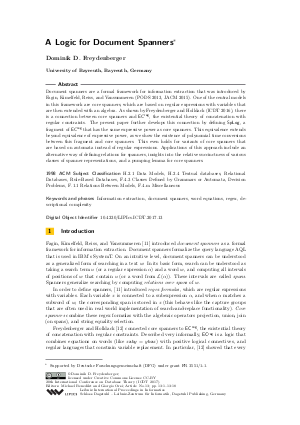A Logic for Document Spanners
Author Dominik D. Freydenberger
-
Part of:
Volume:
20th International Conference on Database Theory (ICDT 2017)
Part of: Series: Leibniz International Proceedings in Informatics (LIPIcs)
Part of: Conference: International Conference on Database Theory (ICDT) - License:
 Creative Commons Attribution 3.0 Unported license
Creative Commons Attribution 3.0 Unported license
- Publication Date: 2017-03-17
File

PDF
LIPIcs.ICDT.2017.13.pdf
- Filesize: 0.57 MB
- 18 pages
Document Identifiers
Subject Classification
Keywords
- information extraction
- document spanners
- word equations
- regex
- descriptional complexity
Metrics
- Access Statistics
-
Total Accesses (updated on a weekly basis)
0Document
0Metadata
Abstract
Document spanners are a formal framework for information extraction that was introduced by [Fagin, Kimelfeld, Reiss, and Vansummeren, J.ACM, 2015]. One of the central models in this framework are core spanners, which are based on regular expressions with variables that are then extended with an algebra. As shown by [Freydenberger and Holldack, ICDT, 2016], there is a connection between core spanners and EC^{reg}, the existential theory of concatenation with regular constraints. The present paper further develops this connection by defining SpLog, a fragment of EC^{reg} that has the same expressive power as core spanners. This equivalence extends beyond equivalence of expressive power, as we show the existence of polynomial time conversions between this fragment and core spanners. This even holds for variants of core spanners that are based on automata instead of regular expressions. Applications of this approach include an alternative way of defining relations for spanners, insights into the relative succinctness of various classes of spanner representations, and a pumping lemma for core spanners.
Cite As Get BibTex
Dominik D. Freydenberger. A Logic for Document Spanners. In 20th International Conference on Database Theory (ICDT 2017). Leibniz International Proceedings in Informatics (LIPIcs), Volume 68, pp. 13:1-13:18, Schloss Dagstuhl – Leibniz-Zentrum für Informatik (2017)
https://doi.org/10.4230/LIPIcs.ICDT.2017.13
BibTex
@InProceedings{freydenberger:LIPIcs.ICDT.2017.13,
author = {Freydenberger, Dominik D.},
title = {{A Logic for Document Spanners}},
booktitle = {20th International Conference on Database Theory (ICDT 2017)},
pages = {13:1--13:18},
series = {Leibniz International Proceedings in Informatics (LIPIcs)},
ISBN = {978-3-95977-024-8},
ISSN = {1868-8969},
year = {2017},
volume = {68},
editor = {Benedikt, Michael and Orsi, Giorgio},
publisher = {Schloss Dagstuhl -- Leibniz-Zentrum f{\"u}r Informatik},
address = {Dagstuhl, Germany},
URL = {https://drops.dagstuhl.de/entities/document/10.4230/LIPIcs.ICDT.2017.13},
URN = {urn:nbn:de:0030-drops-70493},
doi = {10.4230/LIPIcs.ICDT.2017.13},
annote = {Keywords: information extraction, document spanners, word equations, regex, descriptional complexity}
}
Author Details
References
-
P. Barceló and P. Muñoz. Graph logics with rational relations: the role of word combinatorics. In Proc. CSL-LICS 2014, 2014.

-
J.-C. Birget. Intersection and union of regular languages and state complexity. Inform. Process. Lett., 43(4):185-190, 1992.

-
B. Carle and P. Narendran. On extended regular expressions. In Proc. LATA 2009, 2009.

-
L. Ciobanu, V. Diekert, and M. Elder. Solution sets for equations over free groups are EDT0L languages. In Proc. ICALP 2015, 2015.

-
Elena Czeizler. The non-parametrizability of the word equation xyz=zvx: A short proof. Theor. Comput. Sci., 345(2-3):296-303, 2005.

-
V. Diekert. Makanin’s Algorithm. In M. Lothaire, editor, Algebraic Combinatorics on Words, chapter 12. Cambridge University Press, 2002.

-
V. Diekert. More than 1700 years of word equations. In Proc. CAI 2015, 2015.

-
V. Diekert, A. Jeż, and W. Plandowski. Finding all solutions of equations in free groups and monoids with involution. In Proc. CSR 2014, 2014.

-
V. G. Durnev. Undecidability of the positive ∀∃³-theory of a free semigroup. Sib. Math. J., 36(5):917-929, 1995.

-
A. Ehrenfeucht and G. Rozenberg. A pumping theorem for EDT0L languages. Technical report, Tech. Rep. CU-CS-047-74, University of Colorado, 1974.

-
R. Fagin, B. Kimelfeld, F. Reiss, and S. Vansummeren. Document spanners: A formal approach to information extraction. J. ACM, 62(2):12, 2015.

-
D. D. Freydenberger and M. Holldack. Document spanners: From expressive power to decision problems. In Proc. ICDT 2016, 2016.

-
M. R. Garey and D. S. Johnson. Computers and Intractability. W. H. Freeman and Company, 1979.

-
S. Ginsburg and E. H. Spanier. Bounded regular sets. Proc. AMS, 17(5):1043-1049, 1966.

-
J. E. Hopcroft and J. D. Ullman. Introduction to Automata Theory, Languages, and Computation. Addison-Wesley, 1979.

-
L. Ilie. Subwords and power-free words are not expressible by word equations. Fundam. Inform., 38(1-2):109-118, 1999.

-
L. Ilie and W. Plandowski. Two-variable word equations. ITA, 34(6):467-501, 2000.

-
J. Karhumäki, F. Mignosi, and W. Plandowski. The expressibility of languages and relations by word equations. J. ACM, 47(3):483-505, 2000.

-
J. Karhumäki, W. Plandowski, and W. Rytter. Generalized factorizations of words and their algorithmic properties. Theor. Comput. Sci., 218(1):123-133, 1999.

-
J. Karhumäki and A. Saarela. An analysis and a reproof of Hmelevskii’s theorem. In Proc. DLT 2008, 2008.

-
G. Navarro. A guided tour to approximate string matching. ACM Comput. Surv., 33(1):31-88, 2001.

-
D. Reidenbach and M. L. Schmid. Patterns with bounded treewidth. Inform. Comput., 239:87-99, 2014.

-
M. L. Schmid. Characterising REGEX languages by regular languages equipped with factor-referencing. Inform. Comput., 249:1-17, 2016.

